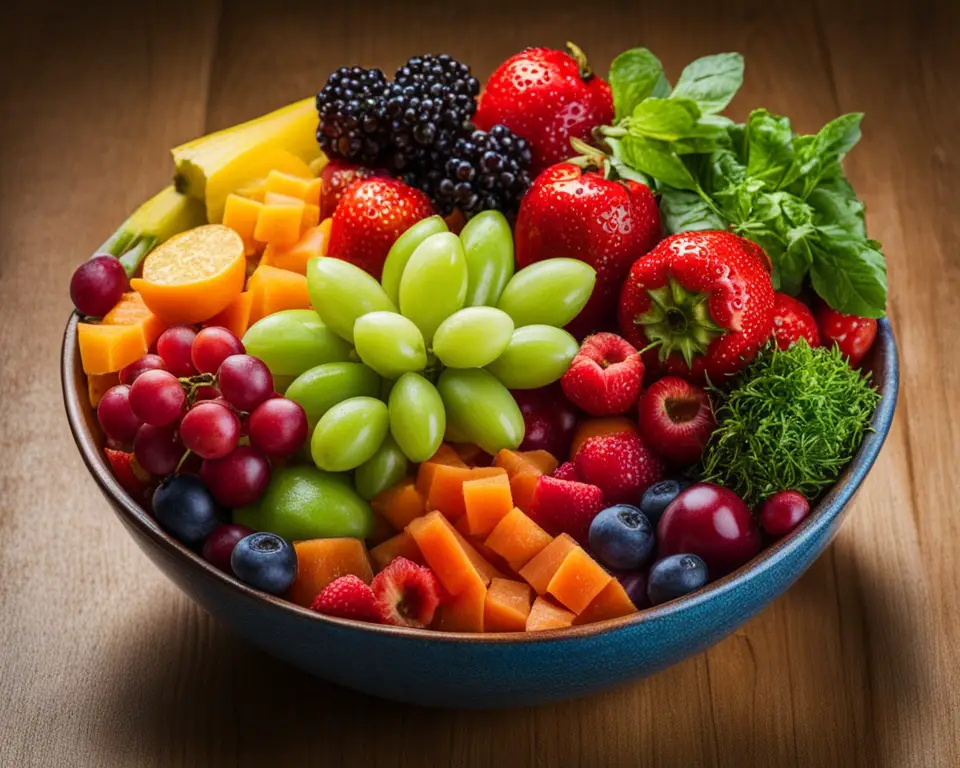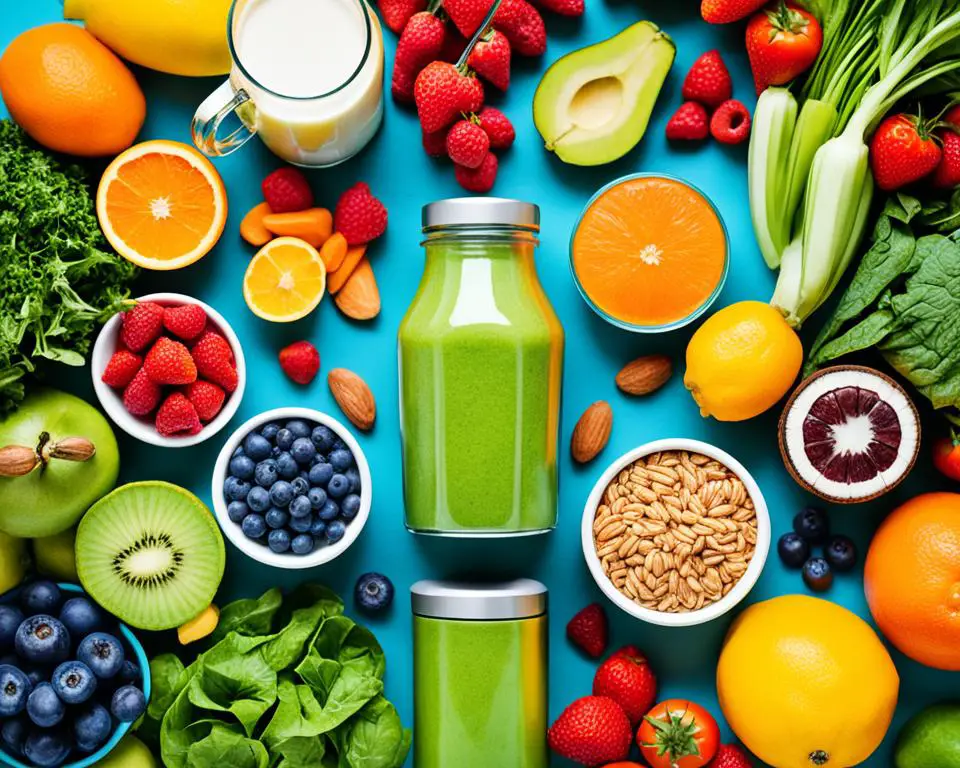Welcome to the ultimate nutrition guide! It’s all about making healthy eating easy and fun. Imagine adding spinach and kale to your smoothie or making a pizza crust with cauliflower. Sounds exciting, right?
At Nutrition One, we aim to make eating well both easy and fun. A balanced diet is key for our health and happiness. It includes carbs, proteins, and fats for energy and vitamins for a strong immune system. Don’t forget, supplements like DMoose Multi-Vitamin can help fill any nutritional gaps.
Key Takeaways
- Leafy greens like spinach and kale are rich in vitamin K and folate, supporting bone health and cell repair.
- Berries such as strawberries and blueberries are high in antioxidants and fiber, reducing the risk of heart disease and cancer.
- Fatty fish like salmon and mackerel are excellent sources of omega-3 fatty acids for brain function and heart health.
- Whole grains provide essential nutrients and fiber, promoting digestive health and energy.
- Greek yogurt offers protein and probiotics, aiding muscle repair and gut health.
The Basics of Nutrition
Understanding nutrition is key to staying healthy. Let’s look at macronutrients and micronutrients. We’ll see why eating a balanced diet is important for our health.
Macronutrients: Carbohydrates, Proteins, and Fats
Macronutrients are the big nutrients our bodies need. Each one has a special role:
- Carbohydrates: These make up 45-65% of our daily calories. Whole grains and veggies give us fiber and keep us feeling full longer. But, sugary foods can lead to insulin resistance.
- Proteins: Proteins help fix tissues and prevent hunger. They should be 10-35% of our daily food. Good sources include lean meats, fish, and beans.
- Fats: Fats have nine calories per gram and should be 20-35% of our calories. Good fats help our heart and brain. Bad fats should be less than 10% of our diet.
Micronutrients: Vitamins and Minerals
Micronutrients are vitamins and minerals we need in small amounts. They keep us healthy:
- Vitamins: These come in fat-soluble and water-soluble types. Vitamin C boosts our immune system, and D is good for bones.
- Minerals: We need big amounts of calcium, phosphorus, sodium, and potassium. Smaller amounts of copper, fluoride, and zinc are also important. These help with muscle and bone health.
Importance of a Balanced Diet
Eating a balanced diet means getting the right mix of nutrients. The 2020-2025 Dietary Guidelines suggest eating foods from all groups. This keeps our immune system strong, bones healthy, and energy up. It makes us feel better overall.
Understanding Calories and Energy Balance
Calories are like energy units from food. They are key to our health and managing weight. Knowing how they affect us is crucial.
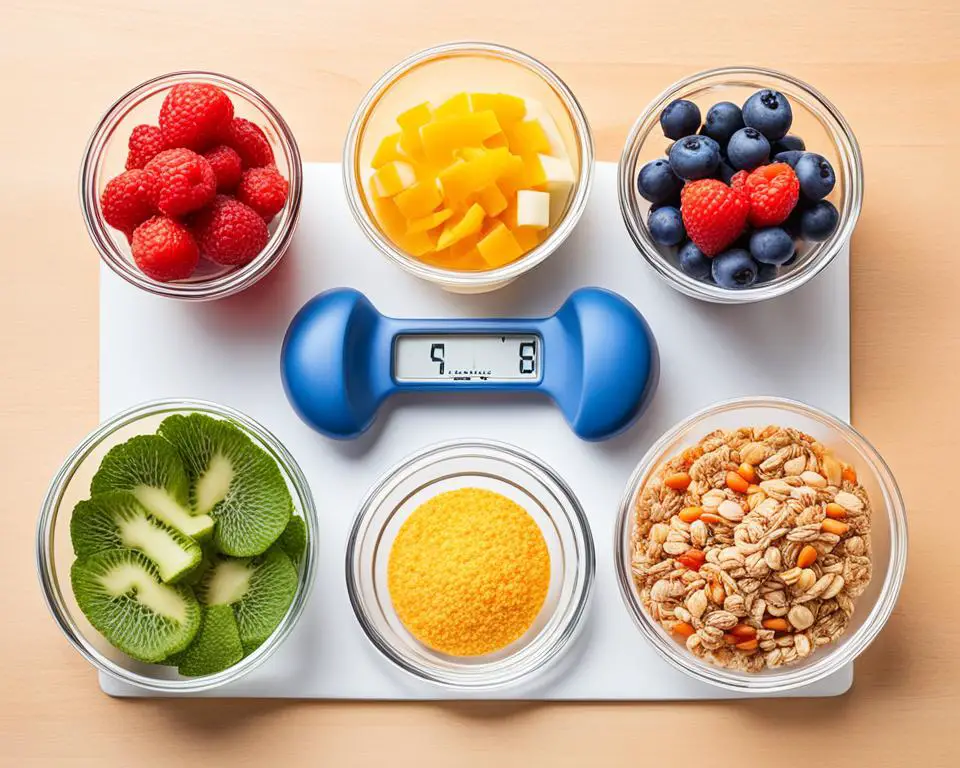
What are Calories?
Calories are what our bodies use for energy. They help us do everything from simple cell tasks to hard workouts. Here’s how much energy different foods give us:
- Carbohydrates: 4 calories per gram
- Proteins: 4 calories per gram
- Fats: 9 calories per gram
Fats give us more energy per gram. This makes them a powerful source of calories.
Energy Balance for Weight Management
Energy balance is key for keeping a healthy weight. It’s the balance between calories from food and drinks and calories burned through activity and metabolism. This balance helps keep weight stable.
| Group | Caloric Needs (Sedentary) | Caloric Needs (Active) |
|---|---|---|
| Children (2-3 years) | 1,000 kcal | Up to 1,400 kcal |
| Women (19-30 years) | 2,000 kcal | 2,400 kcal |
| Men (31-50 years) | 2,200 kcal | 2,800 kcal |
Keeping calories in balance helps with weight control. Too many calories can lead to weight gain. Too few can cause weight loss. For example, eating 150 extra calories a day can add 5 pounds in six months.
Impact of Physical Activity
Being active helps manage calories and burn more. Activities like walking two miles or cycling for 30 minutes can burn about 150 calories. This helps keep calorie balance.
Exercise also makes our metabolism work better for up to 38 hours after. This is called EPOC. Being active not only burns calories but also makes our bodies use insulin better. This helps with storing nutrients and staying healthy.
So, staying active is key for managing weight and staying well for a long time.
Essential Nutrients and Their Sources
Knowing what nutrients we need and where to find them is key to staying healthy. A balanced diet should include carbohydrates, proteins, fats, vitamins, and minerals. These nutrients are vital for our bodies to work right.
Carbohydrates: Fuel for the Body
Carbs give our bodies energy. They help our brains, keep our digestion going, and support our immune system. Good carbs come from quinoa, brown rice, whole grains, oatmeal, fruits, and barley.
According to the Dietary Guidelines for Americans, carbs should be 45 to 65 percent of our daily calories.
Proteins: Tissue Repair and Enzyme Production
Proteins are important for building muscles, making antibodies, and producing hormones. They also fuel our cells. You can find proteins in red meats, poultry, fish, eggs, dairy, beans, legumes, soy, nuts, and grains like quinoa.
Our bodies are about 16 percent protein. So, eating enough protein is crucial for growth, health, and keeping our bodies running smoothly.
Fats: Energy Storage and Nutrient Absorption
Healthy fats are crucial for cell growth, blood clotting, and lowering the risk of heart disease. They also help make hormones. Fats should make up 20-35% of our daily calories, as the Dietary Guidelines suggest.
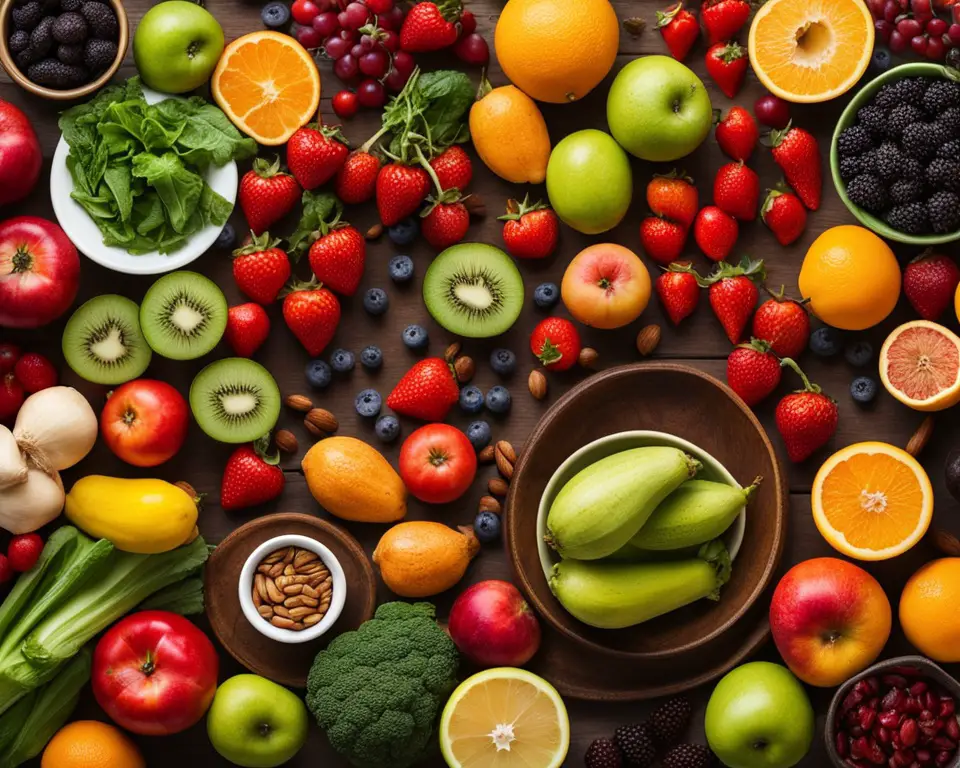
Vitamins and Minerals: Supporting Bodily Functions
There are 13 essential vitamins that our bodies need. They help with energy and keep our immune system strong. You can get these vitamins from eating lots of fruits, vegetables, and lean proteins.
Some people might need supplements if they don’t eat enough fruits and veggies or have certain health issues.
Minerals are also key for our health. They come in two types: macrominerals and trace minerals. Minerals like calcium, sodium, and potassium help with many things, like keeping our skin healthy and our bones strong.
You can find these minerals in foods like red meats, seafood, dairy, nuts, seeds, vegetables, fruits, poultry, fortified bread and cereals, egg yolks, whole grains, and beans and legumes.
| Essential Nutrient | Primary Sources | Main Functions |
|---|---|---|
| Carbohydrates | Quinoa, brown rice, whole grains, fruits, barley | Energy, brain function, immune support |
| Proteins | Red meats, poultry, fish, eggs, beans, dairy, soy, nuts | Muscle growth, tissue repair, enzyme production |
| Fats | Nuts, fish, vegetable oils, seeds | Energy storage, cell growth, hormone production |
| Vitamins | Vegetables, fruits, lean proteins | Energy metabolism, immune support |
| Minerals | Red meats, seafood, dairy, nuts, seeds, leafy greens | Bone health, nerve signal transmission, blood pressure maintenance |
Building a Balanced Plate
Creating a balanced plate is key for a nutritious diet. It’s about managing how much you eat and eating a variety of foods. This ensures your meals are tasty and healthy. Here’s how to make it happen:
Portion Sizes and Food Group Variety
When making your plate, focus on portion control and food variety. Aim for a balanced plate with:
- Half the plate filled with non-starchy vegetables and fruits for essential nutrients and fiber.
- One-quarter of the plate with a plant-based or lean protein source like fish, poultry, beans, or nuts.
- One-quarter of the plate with healthy grains or starches such as whole-wheat bread, whole-grain pasta, or brown rice.
Incorporating Whole Foods
Choosing whole foods over processed ones boosts your meal’s nutrition. Focus on foods like red meat, poultry, seafood, eggs, dairy, whole grains, beans, lentils, nuts, seeds, fruits, and vegetables. These foods are packed with nutrients that keep you healthy all day.
Making Nutritious Choices
Good nutrition is more than picking the right foods. It’s also about how you prepare and eat them. Here are some tips:
- Use healthy oils like olive and canola oil for cooking, salad dressings, and at the table. Limit butter and avoid trans fats.
- Incorporate colorful fruits and vegetables to ensure a wide range of vitamins and minerals.
- Opt for whole grains over refined grains to benefit from added fiber and nutrients.
- Choose lean protein sources and be mindful of avoiding processed meats like bacon and cold cuts.
By focusing on portion control, food variety, whole foods, and making nutritious choices, you can create a balanced plate. This supports your overall health and well-being.
The Role of Carbohydrates
Carbohydrates are key for our energy needs throughout the day. They come in different types, each affecting our health in unique ways. This includes how they help control blood sugar and aid digestion.
Simple vs. Complex Carbohydrates
Carbs are either simple or complex. Simple carbs, like those in pastries and sodas, break down fast. This leads to a quick rise in blood sugar, which can cause weight gain and health problems like diabetes and heart disease.
Complex carbs, found in whole grains, veggies, beans, and legumes, digest slowly. This means they release energy over time. Choosing whole wheat bread, barley, and quinoa over white bread or French fries is a healthier option.
Blood Sugar Control and Digestion
Keeping blood sugar levels stable is key for good health, especially for those with diabetes. Complex carbs are vital here. They digest slowly, causing a steady rise in blood sugar. This reduces the risk of blood sugar spikes and crashes.
Eating whole grains, beans, and legumes helps control blood sugar. These foods provide energy and protein for steady energy levels and better digestion.

Importance of Dietary Fiber
Dietary fiber is crucial for a healthy diet. It keeps digestion healthy and helps you feel full, which aids in managing weight. Adults should aim for 25 to 30 grams of fiber a day, but many get less.
Increasing fiber intake can lower the risk of heart disease, stroke, obesity, colon and rectal cancers, and type 2 diabetes. A healthy diet should include half fruits and veggies, one-quarter whole grains, and one-quarter protein. For example, eating an orange gives you more fiber and less sugar than drinking orange juice, showing the value of whole foods over processed ones.
| Food Item | Dietary Fiber (grams) | Blood Sugar Impact |
|---|---|---|
| Whole Wheat Bread | 3.6 | Low |
| White Bread | 0.8 | High |
| Quinoa (1 cup) | 5.2 | Low |
| Potatoes (1 medium) | 2.2 | Moderate to High |
| Beans (1 cup) | 15.0 | Low |
Choosing complex carbs and high-fiber foods while watching blood sugar levels is key for good health. By understanding carbs, we can make better food choices for our long-term health.
Protein: The Building Block of the Body
Protein is key for building muscles, tissues, and organs. It helps with muscle growth and fixing tissues. That’s why it’s important in a balanced diet.
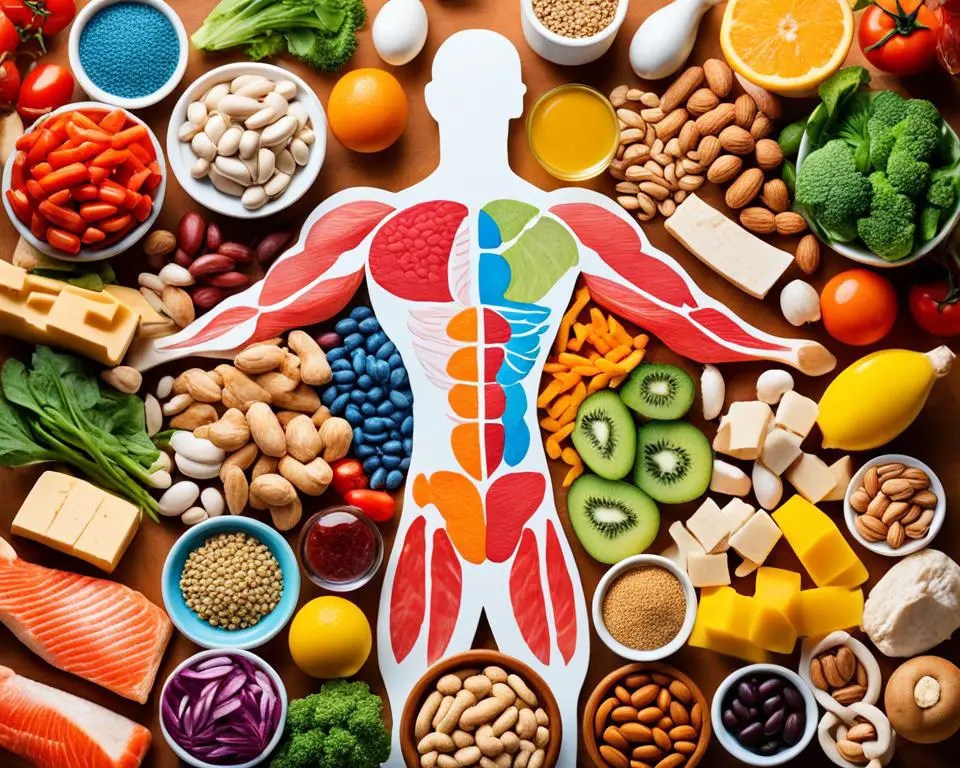
Complete and Incomplete Proteins
Proteins are made of amino acid chains. There are twenty amino acids in the body. Adults need eight essential amino acids, and kids need nine.
Complete proteins have all essential amino acids. You can find them in animal products like beef and fish. Incomplete proteins, found in plants, lack some amino acids. Mixing different plants can give you all the amino acids you need.
Sources of Protein
Many foods offer protein, fitting different diets. Lean meats, fish, and nuts are good sources. Whole grains also have more protein than refined ones. For fitness lovers, protein supplements like DMoose Whey can help meet protein needs.
| Protein Source | Protein (grams per ounce) |
|---|---|
| Chicken Breast | 7 grams |
| Fish (Salmon) | 7 grams |
| Kidney Beans | 7 grams |
| Almonds | 6 grams |
| Quinoa | 4 grams |
Benefits for Muscle Growth and Repair
Getting enough protein is key for muscle growth and repair. The right amount varies but should be 10% to 35% of your calories. Protein helps muscles repair after exercise, leading to muscle growth.
Proteins turn into amino acids in the body. These amino acids help with muscle repair and growth. So, eating a mix of proteins is good for muscle health and overall well-being. Using tools like the USDA’s food guide can help make good food choices.
Nutrition One: Personalized Nutrition for Optimal Health
Personalized nutrition can greatly improve your health and wellness. It means tailoring diet and lifestyle to fit your unique needs. This approach is more effective and sustainable than general advice.
Individualized Nutrition Plans
These plans consider many factors like your health history, current diet, lifestyle, and genes. This detailed approach makes sure the plan meets your health goals. The ZOE study showed that people react differently to foods, making personalized plans key.
A study with over 1,200 people found that personalized nutrition led to eating less red meat, salt, and saturated fat. This led to better diets. Over 80% of those on the ZOE plan for three months lost weight, with an average of 9.4 pounds.
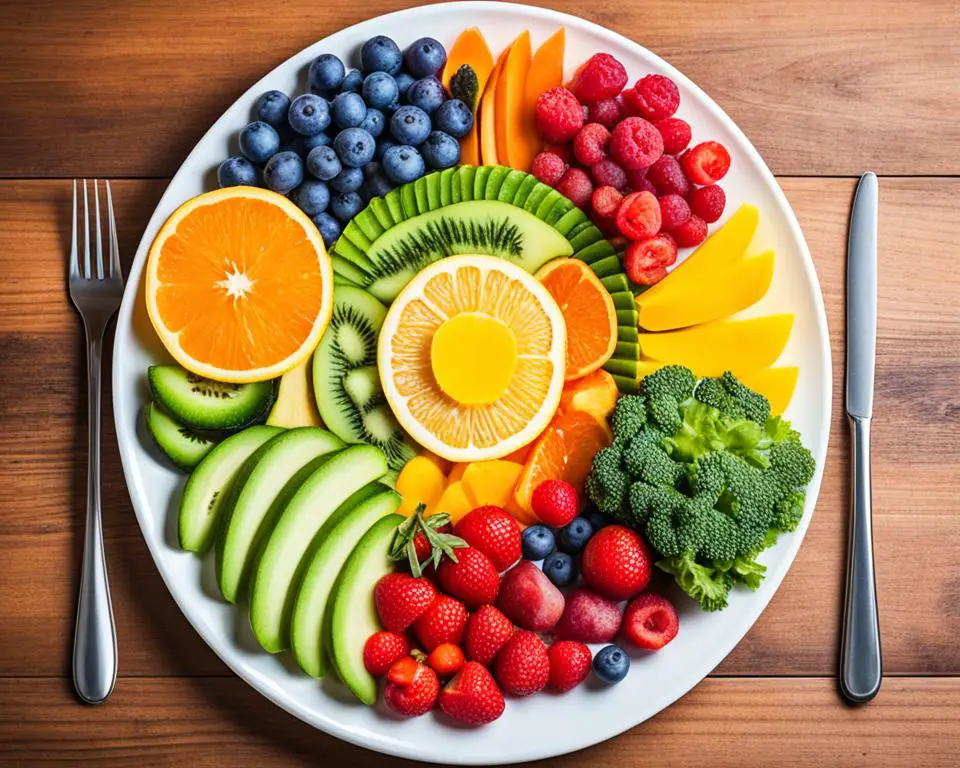
Role of Functional and Pathology Testing
Functional and pathology testing are vital for a precise nutrition plan. They check health levels and spot issues that standard tests might overlook. These tests give a detailed view of your health, helping create a plan that targets specific issues.
These tests can pinpoint factors behind chronic conditions, making it easier to find solutions. For instance, not responding well to certain foods could mean a higher risk of metabolic diseases. This calls for specific dietary changes.
Personalized Support Process
This process helps you reach your health goals by focusing on your unique health concerns and goals. It includes wellness consultations to go over health assessments and test results. This helps create a plan that fits you.
Working with healthcare and nutrition experts, you get ongoing support and plan adjustments. This teamwork ensures your nutrition plan stays effective, adapting to your health and lifestyle changes.
| Feature | General Dietary Advice | Personalized Nutrition |
|---|---|---|
| Approach | One-size-fits-all | Customized to individual needs |
| Effectiveness | Variable | High |
| Support | Minimal | Comprehensive Wellness Consultations |
| Diagnostics | Basic | Functional Testing & Pathology Testing |
Boosting Your Vitality with Simple Habits
Improving your vitality means adding simple habits to your daily life. Let’s look at some key practices to help you feel better.
Embrace Movement
Regular physical activities boost your energy and flexibility. Simple actions like walking briskly or stretching at work can give you a big vitality boost.
Practice Meditation
Meditation helps reduce stress and clear your mind. In fact, daily meditation helps 85% of people feel better mentally.
Sleep Better
Good sleep is key for your immune system and health. Regular sleep habits and relaxation techniques can make your sleep much better.
Choose Real Foods & Protein
Eating real foods and enough protein keeps your energy up. For instance, eating protein for breakfast can stop cravings later. Snacking on foods full of nutrients can boost your vitality when you’re feeling tired.
Get More Iodine & Folate
Getting enough iodine and eating folate-rich foods like leafy greens and beans boosts your metabolism and immune system. This helps with many body functions and keeps your nutrition balanced.
Add Herbs & Supplements
Herbs and supplements like B vitamins and vitamin C support your vitality. Adding these can make you feel more energetic and healthy.
| Habit | Impact | Percentage of People Benefited |
|---|---|---|
| Keeping a food diary | Improved likelihood of following a healthy eating plan | 78% |
| Trying new seasonal vegetables | Willingness to try new recipes | 92% |
| Stocking up on frozen/canned goods | Increased fruit and vegetable intake | 64% |
| Snacking on nutrient-packed foods | Boosted vitality during low energy periods | 72% |
| Practicing meditation daily | Enhanced mental well-being | 85% |
| Reaching daily water intake goals | Specific hydration targets | 89% |
The Importance of Micronutrients
Micronutrients are key to our health. They include vitamins and minerals needed in small amounts. These nutrients are crucial for preventing deficiencies and keeping our bodies working right. They help with energy production and boost our immune system.
These tiny nutrients offer big health benefits. For example, vitamins A and C can lower the risk of cancer. Minerals like iron and copper may slow down Alzheimer’s disease. Selenium is linked to a lower risk of heart disease.
Getting enough vitamins and minerals is important. A balanced diet is key. Here’s what adults over 19 need:
| Micronutrient | Recommended Intake |
|---|---|
| Vitamin B1 (thiamine) | 1.1-1.2 mg |
| Vitamin B2 (riboflavin) | 1.1-1.3 mg |
| Vitamin B3 (niacin) | 14-16 mg |
| Vitamin B5 (pantothenic acid) | 5 mg |
| Vitamin B6 (pyridoxine) | 1.3-1.7 mg |
| Vitamin B7 (biotin) | 30 mcg |
| Vitamin B9 (folate) | 400 mcg |
| Vitamin B12 (cobalamin) | 2.4 mcg |
| Vitamin C (ascorbic acid) | 75-90 mg |
| Vitamin A | 700-900 mcg |
| Vitamin D | 15-20 mcg |
| Vitamin E | 15 mg |
| Vitamin K | 90-120 mcg |
| Calcium | 1000-1200 mg |
| Phosphorus | 700 mg |
| Magnesium | 310-420 mg |
| Sodium | 1500 mg |
| Chloride | 1800-2300 mg |
| Potassium | 2600-3400 mg |
| Iron | 8-18 mg |
| Manganese | 1.8-2.3 mg |
| Copper | 900 mcg |
| Zinc | 8-11 mg |
| Iodine | 150 mcg |
| Fluoride | 3-4 mg |
| Selenium | 55 mcg |
Getting the right amount of these nutrients is key. It helps avoid deficiencies and boosts health.
Conclusion
As we wrap up our guide on nutritional wellness, it’s clear that a balanced nutrition plan is key for better health and energy. Nutrition is vital at every life stage, from childhood to adulthood. It’s important to eat a mix of macro and micronutrients.
This guide talked about habits for a healthy life, like knowing about calories and staying active for weight control. It also showed how physical activity plays a big role. Seeing nutrition as a way to improve health, not just follow rules, makes it more fun and flexible.
Following the tips in this guide can really help you get healthier. By moving more, meditating, and eating a variety of foods, you can live a balanced life. Good nutrition is key for kids’ health, growth, and learning, and it affects them as adults too. For more info, check out the Institute of Medicine reports. Also, adding nutrition classes in school can boost community health.
Using a whole approach to nutrition and making lifestyle changes is crucial for lasting wellness. Let this guide motivate you to make smart, healthy choices. Enjoy the benefits of eating well and living a balanced life.
Source Links
- Unlocking Vitality: A Guide to Maintaining a Healthy Diet – Gulfcoasthc
- Vitality One – Apps on Google Play
- Best Nutrients for Men and Everything You Need to Know About Them – Vitality Rx
- Nutrition Fundamentals | Nutrition & Healthy Eating Basics
- Nutrition and healthy eating Nutrition basics
- 1. Nutrition Basics
- Energy Balance and Obesity, Healthy Weight Basics, NHLBI, NIH
- Calories and Energy Balance – The Muscle PhD
- Weight Loss Simplified: Understanding Calories and Energy Balance
- 6 essential nutrients: Sources and why you need them
- Essential Nutrients
- 6 Essential Nutrients: What They Are and Why You Need Them
- Healthy Eating Plate
- How to Create a Balanced Meal
- Carbohydrates
- Carbohydrates: Getting the Most Out Of Fiber, Starches & Sugars
- Choose your carbs wisely
- Protein in diet: MedlinePlus Medical Encyclopedia
- Protein: Building Blocks of the Body
- A Building Block for Good Health: The Benefits of Protein
- Personalized Nutrition Explained: Why Everyone Is Different
- Personalized Nutrition: A Functional Dietitian’s Approach to Optimal Health
- NIH launches largest precision nutrition research effort of its kind | All of Us Research Program
- Effort-free ways to improve health and wellness – Fit Planet
- The Do’s and Don’ts of Eating for Energy
- 5 simple habits to boost your vitality
- Micronutrients: Types, Functions, Benefits and More
- Micronutrient Facts
- Micronutrients in health and disease
- III. CONCLUSIONS AND RECOMMENDATIONS
- 1 Summary, Conclusions, and Recommendations | Nutrition During Lactation
- Focus: Nutrition and Food Science: Importance of Nutrients and Nutrient Metabolism on Human Health


